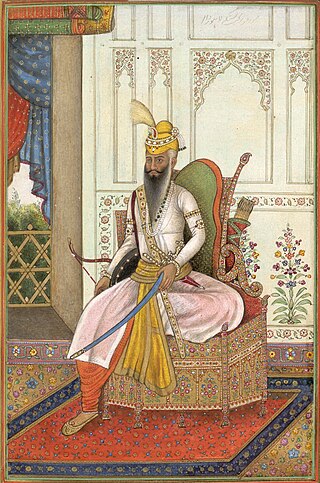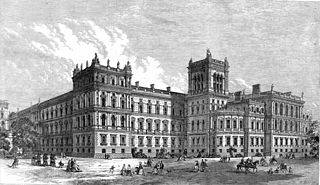Related Research Articles

Company rule in India was the rule of the British East India Company on the Indian subcontinent. This is variously taken to have commenced in 1757, after the Battle of Plassey, when the Nawab of Bengal Siraj ud-Daulah was defeated and replaced with Mir Jafar, who had the support of the East India Company; or in 1765, when the Company was granted the diwani, or the right to collect revenue, in Bengal and Bihar; or in 1773, when the Company abolished local rule (Nizamat) in Bengal and established a capital in Calcutta, appointed its first Governor-General, Warren Hastings, and became directly involved in governance. The Company ruled until 1858, when, after the Indian Rebellion of 1857 and the Government of India Act 1858, the India Office of the British government assumed the task of directly administering India in the new British Raj.

Colonel William Henry Sykes, FRS was an English naturalist who served with the British military in India and was specifically known for his work with the Indian Army as a politician, Indologist and ornithologist. One of the pioneers of the Victorian statistical movement, a founder of the Royal Statistical Society, he conducted surveys and examined the efficiency of army operation. Returning from service in India, he became a director of the East India Company and a member of parliament representing Aberdeen.

Ranjit Singh, popularly known as Sher-e-Punjab or "Lion of Punjab", was the first Maharaja of the Sikh Empire, which ruled the northwest Indian subcontinent in the early half of the 19th century. He survived smallpox in infancy but lost sight in his left eye. He fought his first battle alongside his father at age 10. After his father died, he fought several wars to expel the Afghans in his teenage years and was proclaimed as the "Maharaja of Punjab" at age 21. His empire grew in the Punjab region under his leadership through 1839.

Charles Theophilus Metcalfe, 1st Baron Metcalfe,, known as Sir Charles Metcalfe, Bt between 1822 and 1845, was a British colonial administrator. He held appointments including acting Governor-General of India, Governor of Jamaica and Governor General of the Province of Canada.

The Hashemite Kingdom of Hejaz was a state in the Hejaz region of the Western Asia that included the western portion of the Arabian Peninsula that was ruled by the Hashemite dynasty. It was self-proclaimed as a kingdom in June 1916 during the First World War, to be independent from the Ottoman Empire, on the basis of an alliance with the British Empire to drive the Ottoman Army from the Arabian Peninsula during the Arab Revolt.

The British Raj was the rule of the British Crown on the Indian subcontinent; it is also called Crown rule in India, or Direct rule in India, and lasted from 1858 to 1947. The region under British control was commonly called India in contemporaneous usage and included areas directly administered by the United Kingdom, which were collectively called British India, and areas ruled by indigenous rulers, but under British paramountcy, called the princely states. The region was sometimes called the Indian Empire, though not officially.
Ahir or Aheer are a community of traditionally non-elite pastoralists in India, most members of which identify as being of the Indian Yadav community because they consider the two terms to be synonymous. The Ahirs are variously described as a caste, a clan, a community, a race and a tribe.

After the Indian Rebellion of 1857, the British Government took over the administration to establish the British Raj. The British Raj was the period of British rule on the Indian subcontinent between 1858 and 1947, for around 89 years of British occupation. The system of governance was instituted in 1858 when the rule of the East India Company was transferred to the Crown in the person of Queen Victoria.

The Colonial Office was a government department of the Kingdom of Great Britain and later of the United Kingdom, first created in 1768 from the Southern Department to deal with colonial affairs in North America, until merged into the new Home Office in 1782.

The historiography of the British Empire refers to the studies, sources, critical methods and interpretations used by scholars to develop a history of the British Empire. Historians and their ideas are the main focus here; specific lands and historical dates and episodes are covered in the article on the British Empire. Scholars have long studied the Empire, looking at the causes for its formation, its relations to the French and other empires, and the kinds of people who became imperialists or anti-imperialists, together with their mindsets. The history of the breakdown of the Empire has attracted scholars of the histories of the United States, the British Raj, and the African colonies. John Darwin (2013) identifies four imperial goals: colonising, civilising, converting, and commerce.

The history of Egypt under the British lasted from 1882, when it was occupied by British forces during the Anglo-Egyptian War, until 1956 after the Suez Crisis, when the last British forces withdrew in accordance with the Anglo-Egyptian agreement of 1954. The first period of British rule (1882–1914) is often called the "veiled protectorate". During this time the Khedivate of Egypt remained an autonomous province of the Ottoman Empire, and the British occupation had no legal basis but constituted a de facto protectorate over the country. Egypt was thus not part of the British Empire. This state of affairs lasted until 1914 when the Ottoman Empire joined World War I on the side of the Central Powers and Britain declared a protectorate over Egypt. The ruling khedive, Abbas II, was deposed and his successor, Hussein Kamel, compelled to declare himself Sultan of Egypt independent of the Ottomans in December 1914.
British Studies, officially the Faculty Seminar on British Studies is a weekly seminar at the University of Texas at Austin that has met continually since 1975. British Studies is directed by Wm. Roger Louis, a founding member of the seminar and a distinguished historian at the University of Texas. The seminar is sponsored by the British Studies Program at UT, a program that also appoints junior fellows annually from among UT's faculty, and offers Churchill Scholarships to graduate students and undergraduates. The seminar has produced a book series—with the Harry Ransom Humanities Research Center and I.B. Tauris of London— containing a selection of lectures delivered to the seminar: Adventures with Britannia (1995), More Adventures with Britannia (1998), Still More Adventures with Britannia (2003), Yet More Adventures with Britannia (2005), Penultimate Adventures with Britannia (2008), and Ultimate Adventures with Britannia (2009).

Sir Alfred Woodley Croft was a British educationist and administrator who spent most of his career in India. From 1877 until his retirement in 1897 he was Director of Public Instruction in Bengal, and was appointed a Companion of the Order of the Indian Empire (CIE) in November 1884.

The Oxford History of the British Empire is a five-volume history of the British Empire published by the Oxford University Press in 1998 and 1999. According to the publisher, the series "deals with the interaction of British and non-western societies from the Elizabethan era to the late twentieth century, aiming to provide a balanced treatment of the ruled as well as the rulers, and to take into account the significance of the Empire for the peoples of the British Isles". The editor-in-chief for the main series was Wm. Roger Louis.
Miles Taylor, FRHistS is a historian of 19th-century Britain, and an academic administrator. Since 2004, he has been a professor of history at the University of York and between 2008 and 2014 he was director of the University of London's Institute of Historical Research.
Nandini Das is professor of Early Modern Literature and Culture in the English faculty at the University of Oxford. She is a specialist in Shakespeare studies, Renaissance romance writing, early travel literature, and encounters between different cultures.
Colonel Samuel Hennell was a British Indian Army officer and Colonial Office administrator in the Middle East. He was the British Political Resident for the Persian Gulf from 1838 to 1852 and described by Professor JB Kelly as: 'without doubt the greatest Political Resident Britain has ever had in the Persian Gulf.'
Sir Archdale Earle, KCIE was a British Indian administrator and former Chief Commissioner of Assam Province.
Seema Alavi is an Indian historian. She is a professor of history at Ashoka University, India and specializes in medieval and early modern South Asia.

This is a select bibliography of English language books and journal articles about the History of Central Asia. A brief selection of English translations of primary sources is included. Book entries have references to journal articles and reviews about them when helpful. Additional bibliographies can be found in many of the book-length works listed below; see Further Reading for several book and chapter-length bibliographies. The External Links section contains entries for publicly available select bibliographies from universities. this bibliography specifically excludes non-history related works and self-published books.
References
- ↑ "Douglas Peers".
- ↑ "Doug Peers". 3 October 2023.
- ↑ "Douglas M. Peers".
- ↑ "Douglas Peers". 3 August 2012.
- ↑ Wainwright, A. (2014). Douglas M. Peers and Nandini Gooptu, eds. India and the British Empire. Oxford History of the British Empire Companion series. Oxford: Oxford University Press, 2012. pp. 388. $65.00 (cloth). Journal of British Studies , 53(2), 550-551.
- ↑ Roy, Kaushik (1996). "Book Reviews : DOUGLAS M. PEERS, Between Mars and Mammon, Colonial Armies and the Garrison State in India, 1819-1835, Tauris Academic Studies, I.B. Tauris Publishers, London, New York, 1995, xxi + 289 pp., £39.50". The Indian Economic & Social History Review. 33 (4): 488–490. doi:10.1177/001946469603300411. S2CID 144720340.
- ↑ Fisher, Michael H. (1997). "British and Indian Interactions before the British Raj in India, 1730s-1857". Journal of British Studies. 36 (3): 363–370. doi:10.1086/386141. JSTOR 175793. S2CID 249899099.
- ↑ Crowell, Lorenzo M. (1996). "Reviewed work: Between Mars and Mammon: Colonial Armies and the Garrison State in India, 1819-1835, Douglas M. Peers". Albion: A Quarterly Journal Concerned with British Studies. 28 (4): 743–745. doi:10.2307/4052088. JSTOR 4052088.